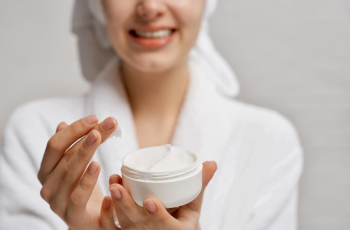
Augustinus Bader’s The Retinol Serum: An In-Depth Review
The Esteemed Augustinus Bader Brand
When you think of luxury skincare, Augustinus Bader is likely one of the first names that come to mind. Known for its cutting-edge formulations and impressive efficacy, the brand has become synonymous with high-end skincare. The Rich Cream, in particular, has gained a cult following, making its way to the top shelves of beauty enthusiasts, editors, and skincare professionals. But the allure of Augustinus Bader is not just in its sleek packaging or high price tag; it’s about the science behind the products that have transformed the skincare routines of countless individuals.
Augustinus Bader has a deep-rooted philosophy of combining advanced skincare technology with high-quality ingredients to deliver products that not only promise results but also nurture and care for the skin. One of the things that set Augustinus Bader apart from other luxury skincare brands is its commitment to innovation. The brand is built around the concept of TFC8 technology, a proprietary complex that drives the effectiveness of all their products, including their highly coveted creams and serums.
And now, after years of delivering high-performance skincare, Augustinus Bader has launched a groundbreaking new product: the Retinol Serum. As someone who has had personal experience with prescription-strength retinoids like Tretinoin, I was particularly curious to see how this luxurious serum stacked up. So, after using The Retinol Serum for several weeks, here’s my comprehensive review of the product—its inspiration, formula, and my experience using it.
The Inspiration Behind Augustinus Bader’s Retinol Serum
Retinol is a skincare ingredient that has been revered for decades for its powerful ability to tackle a wide range of skin concerns. Known for its ability to stimulate collagen production, reduce fine lines and wrinkles, and address issues like acne and hyperpigmentation, retinol is often hailed as the gold standard for anti-aging and skin renewal. However, despite its effectiveness, retinol has a reputation for being somewhat harsh on the skin, especially for individuals with sensitive or dry skin types.
For years, people have had to accept the initial dryness, redness, and flakiness that comes with incorporating retinol into their routine. It’s considered part of the “retinol cycle”—a necessary evil that must be endured to achieve smoother, firmer, and more even-toned skin. However, as we all know, not everyone has the patience or tolerance for these side effects. For some, the irritation can be so severe that they abandon retinol altogether.
This is precisely the issue that Augustinus Bader sought to address with The Retinol Serum. The brand recognized that there was a gap in the market for a retinol product that delivered all the benefits of traditional retinoids without the painful irritation that often accompanies their use. According to Augustinus Bader, this new serum was created in response to customer feedback—people had been asking for a more nourishing, soothing version of retinol, one that could be used by a wider range of consumers, including those with sensitive skin.
In a statement from the brand, they explained that their goal with this product was to create a serum that not only offers the efficacy of traditional retinols but also nourishes and hydrates the skin, making it suitable for individuals who may have previously been hesitant to use retinol due to fears of irritation and discomfort. It was this customer-centric approach that led to the creation of The Retinol Serum, which combines powerful anti-aging ingredients with soothing and hydrating components to create a product that truly addresses the needs of modern skincare enthusiasts.
The Formula: Key Ingredients and Technology
What makes The Retinol Serum stand out from other retinoid products on the market is its thoughtful and innovative formulation. The primary active ingredient, of course, is retinol—but this isn’t just any retinol. Augustinus Bader uses pure retinol, which is known for its effectiveness in promoting cellular turnover and tackling skin concerns like fine lines, wrinkles, and hyperpigmentation. Retinol works by speeding up the skin’s natural shedding process, revealing fresher, more youthful-looking skin beneath. With continued use, it helps to boost collagen and elastin production, which are key to maintaining the skin’s firmness and elasticity as we age.
However, while retinol is an incredibly effective ingredient, it is also well-known for causing irritation. This is where the genius of TFC8 technology comes in. TFC8, or Trigger Factor Complex 8, is a proprietary technology developed by Professor Augustinus Bader that drives the efficacy of the brand’s skincare formulas. TFC8 is a complex blend of natural amino acids, high-grade vitamins, and synthesized molecules that work together to support healthy skin. According to Professor Bader, TFC8 essentially provides the skin with everything it needs for optimal cellular renewal, enhancing the skin’s natural healing processes.
What’s truly remarkable about TFC8 is its ability to adapt to the individual needs of the skin. The technology works by guiding nutrients directly to the skin cells, which helps boost the effectiveness of other ingredients in the formula. In The Retinol Serum, TFC8 enhances the retinol’s ability to resurface the skin, while also ensuring that the formula remains gentle enough for sensitive skin types.
In addition to TFC8, the serum also contains a variety of other ingredients designed to support the skin’s health. One such ingredient is a microbiome blend, which helps maintain the skin’s natural bacterial barrier. This is important because a healthy microbiome is crucial for preventing blemishes and other skin issues. The serum also contains a zinc complex, which regulates sebum production. This is particularly helpful for those dealing with breakouts, as excessive oil production can clog pores and lead to acne. Another noteworthy ingredient is marine ectoine, a powerful hydrator that helps keep the skin moisturized and plump.
Finally, the serum includes Japanese knotweed extract, which helps regulate skin enzyme activity and minimize the buildup of dead skin cells. This reduces dullness and promotes a smoother, more radiant complexion. Together, these ingredients work in harmony to deliver the benefits of retinol without causing irritation.
One of the standout features of The Retinol Serum is what’s not included in the formula. The serum is free from a number of harsh chemicals and additives that are commonly found in other skincare products. Specifically, it is vegan and free from gluten, GMOs, parabens, synthetic fragrances, sulfates, silicones, phthalates, DEA, heavy metals, talc, petrolatum, paraffin, and mineral oil. This makes it suitable for individuals with sensitive skin or those who prefer to avoid certain ingredients in their skincare.
Additionally, the serum is packaged in an eco-friendly container made from 100% recyclable aluminum, with a recyclable carton and leaflet. This reflects Augustinus Bader’s commitment to sustainability and making environmentally-conscious choices in the production of their products.
The Review: How It Performed in My Skincare Routine
As someone who has been using Tretinoin (a prescription-strength retinoid) for years to treat both acne and fine lines, I’ve grown accustomed to the ups and downs of retinoid use. While Tretinoin has been extremely effective for me, it’s also very harsh on my skin. I have sensitive skin that tends to dry out and become irritated when I use strong retinoids. This can be frustrating, especially because Tretinoin is a product that requires consistent use for months to see the full benefits. However, if I take a break or skip a few days, my skin quickly becomes congested, and I experience breakouts and increased fine lines.
When I first heard about The Retinol Serum, I was intrigued. The promise of a gentle yet effective retinol serum that could deliver all the benefits without the irritation was exactly what I had been looking for. So, I decided to put The Retinol Serum to the test. I stopped using Tretinoin for a week and replaced it with The Retinol Serum to see how my skin would react.
From the very first application, I could tell that this product was different. Most retinoids cause an initial period of dryness and redness, but The Retinol Serum was incredibly soothing. My skin felt calm and hydrated right away, with no sign of irritation or discomfort. The serum has a lightweight, almost gel-like texture that absorbs quickly into the skin, leaving behind a smooth, almost velvety finish. It’s not greasy or heavy, which makes it perfect for layering with other nighttime products like moisturizers or oils.
After using the serum for several days, I began to notice some immediate improvements in my skin. It felt smoother and more even-toned, and I didn’t experience the typical dryness or flakiness that usually comes with starting a new retinol product. My acne, which had been a persistent issue for me, was noticeably less pronounced, and my fine lines appeared softer. The best part? My skin looked radiant and healthy, without the redness or irritation that often accompanies stronger retinoids.
It’s important to note that while most retinoids take a few weeks to show full results, I started to see visible improvements almost immediately. The skin’s natural glow and the smoothing effects of the retinol were evident after just a few days of use. However, since retinol works by stimulating cellular turnover, I’m excited to see even more results as I continue to use the serum over the long term.
The Bottom Line: Is It Worth It?
Augustinus Bader’s The Retinol Serum is a game-changer for anyone who loves the benefits of retinol but has struggled with the irritation that often accompanies its use. The serum delivers the powerful anti-aging effects of retinol, while also soothing and hydrating the skin, making it an ideal choice for individuals with sensitive skin. Its lightweight texture, nourishing ingredients, and high-performance formula make it a luxury product that is well worth the investment.
While the price point may be steep for some, the quality of the ingredients and the results it delivers justify the cost. If you’re someone who has been hesitant to try retinol due to concerns about irritation, or if you’re simply looking for a high-quality retinoid that works without the harsh side effects, The Retinol Serum is a fantastic option to consider. I can honestly see this product becoming a staple in my skincare routine for years to come.
In conclusion, if you’re searching for a retinol product that is both effective and gentle, Augustinus Bader’s The Retinol Serum is definitely worth considering. The combination of advanced technology, high-quality ingredients, and the soothing benefits of the formula make it one of the best retinol products on the market today.


